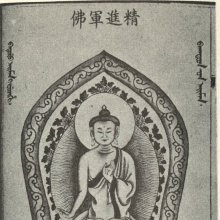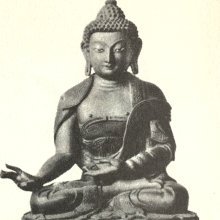Virasena, Vīrasena, Vira-sena: 15 definitions
Introduction:
Virasena means something in Hinduism, Sanskrit, Jainism, Prakrit, the history of ancient India. If you want to know the exact meaning, history, etymology or English translation of this term then check out the descriptions on this page. Add your comment or reference to a book if you want to contribute to this summary article.
Images (photo gallery)
In Hinduism
Purana and Itihasa (epic history)
Source: archive.org: Puranic Encyclopedia1) Vīrasena (वीरसेन).—The father of Nala. It is mentioned in Mahābhārata, Anuśāsana Parva, Chapter 115, Stanza 65, that this King did not eat meat. (For further details see under Damayantī).
2) Vīrasena (वीरसेन).—A King of Kosala. (See under Candrasena I).
Source: Cologne Digital Sanskrit Dictionaries: The Purana Index1a) Vīrasena (वीरसेन).—A Brahman sage who was invited for the Rājasūya of Yudhiṣṭhira.*
- * Bhāgavata-purāṇa X. 74. 9.
1b) A son of Ṛtuparṇa, and father of Sudāsa.*
- * Brahmāṇḍa-purāṇa III. 63. 174.
1c) His son Nala, to be distinguished from the friend of the Ikṣvākus.*
- * Vāyu-purāṇa 88. 175.
Vīrasena (वीरसेन) is a name mentioned in the Mahābhārata (cf. XIII.116.68, XIII.115) and represents one of the many proper names used for people and places. Note: The Mahābhārata (mentioning Vīrasena) is a Sanskrit epic poem consisting of 100,000 ślokas (metrical verses) and is over 2000 years old.

The Purana (पुराण, purāṇas) refers to Sanskrit literature preserving ancient India’s vast cultural history, including historical legends, religious ceremonies, various arts and sciences. The eighteen mahapuranas total over 400,000 shlokas (metrical couplets) and date to at least several centuries BCE.
Kavya (poetry)
Source: Wisdom Library: KathāsaritsāgaraVīrasena (वीरसेन) was a soldier in Sunītha and Sūryaprabha’s army whose strength is considered as equaling a tripple-power warrior (triguṇaratha), according to the Kathāsaritsāgara, chapter 47. Accordingly, as the Asura Maya explained the arrangement of warriors in Sunītha’s army: “... [Vīrasena, and others], these princes are of triple power”.
In chapter 48, Vīrasena was slain by Hariśarman, who fought on Śrutaśarman’s side. Accordingly: “... then a fight took place between those Vidyādhara princes on the one side and Prabhāsa and his comrades on the other, in which there was a great slaughter of soldiers. And in the single combats between the two hosts many warriors were slain on both sides, men, Asuras and Vidyādharas. Vīrasena slew Dhūmralocana and his followers, but, having been deprived of his chariot, he was in his turn killed by Hariśarman”.
The story of Vīrasena was narrated by the Vidyādhara king Vajraprabha to prince Naravāhanadatta in order to relate how “Sūryaprabha, being a man, obtain of old time the sovereignty over the Vidyādharas”.
The Kathāsaritsāgara (‘ocean of streams of story’), mentioning Vīrasena, is a famous Sanskrit epic story revolving around prince Naravāhanadatta and his quest to become the emperor of the vidyādharas (celestial beings). The work is said to have been an adaptation of Guṇāḍhya’s Bṛhatkathā consisting of 100,000 verses, which in turn is part of a larger work containing 700,000 verses.

Kavya (काव्य, kavya) refers to Sanskrit poetry, a popular ancient Indian tradition of literature. There have been many Sanskrit poets over the ages, hailing from ancient India and beyond. This topic includes mahakavya, or ‘epic poetry’ and natya, or ‘dramatic poetry’.
In Jainism
General definition (in Jainism)
Source: archive.org: TrisastisalakapurusacaritraVīrasena (वीरसेन) is the name of an ancient king, according to the Jain Ramayana and chapter 7.4 [Rāma and Lakṣmaṇa] of Hemacandra’s 11th century Triṣaṣṭiśalākāpuruṣacaritra: an ancient Sanskrit epic poem narrating the history and legends of sixty-three illustrious persons in Jainism.—Accordingly, “Siṃharatha’s son, Brahmaratha, became king next, then Cāturmukha, Hemaratha, Śataratha, Udayapṛthu, Vāriratha, Induratha, Ādityaratha, Māndhātṛ, Vīrasena in turn, King Pratimanyu, King Pratibandhu, King Ravimanyu, Vasantatilaka, Kuberadatta, Kunthu, Śarabha, Dvirada in turn, then Siṃhadaśana, Hiraṇyakaśipu, Puñjasthala, Kakutstha, Raghu. Among these kings some reached emancipation and some heaven”.
Source: HereNow4U: Sectarian Differences In Jain Order (II)Vīrasena (वीरसेन).—After suppressing the rule of the Kuṣāṇas, Vīrasena the king of Bhāraśiva Nāga dynasty, divided his kingdom among his three sons and gave Kāntipurī to Hayanāga, Padmāvati to Bhimanāga and Mathura to his third son whose name is unknown.

Jainism is an Indian religion of Dharma whose doctrine revolves around harmlessness (ahimsa) towards every living being. The two major branches (Digambara and Svetambara) of Jainism stimulate self-control (or, shramana, ‘self-reliance’) and spiritual development through a path of peace for the soul to progess to the ultimate goal.
India history and geography
Source: archive.org: Personal and geographical names in the Gupta inscriptionsVīrasena (वीरसेन) is an example of a name based on abstract qualities mentioned in the Gupta inscriptions. The Gupta empire (r. 3rd-century CE), founded by Śrī Gupta, covered much of ancient India and embraced the Dharmic religions such as Hinduism, Buddhism and Jainism. Derivation of personal names (e.g., Vīrasena) during the rule of the Guptas followed patterns such as tribes, places, rivers and mountains.
Gupta inscription No. 6 mentions Vīrasena, the child of Kutsa, the minister for peace and war under Candragupta II, who knew the meanings of the words, and logic, and (the ways of) mankind, who was a poet and who belonged to (the city of) Pāṭaliputra.

The history of India traces the identification of countries, villages, towns and other regions of India, as well as mythology, zoology, royal dynasties, rulers, tribes, local festivities and traditions and regional languages. Ancient India enjoyed religious freedom and encourages the path of Dharma, a concept common to Buddhism, Hinduism, and Jainism.
Languages of India and abroad
Sanskrit dictionary
Source: DDSA: The practical Sanskrit-English dictionaryVīrasena (वीरसेन).—Name of the father of Nala.
Derivable forms: vīrasenaḥ (वीरसेनः).
Vīrasena is a Sanskrit compound consisting of the terms vīra and sena (सेन).
Source: Cologne Digital Sanskrit Dictionaries: Edgerton Buddhist Hybrid Sanskrit DictionaryVīrasena (वीरसेन).—(1) name of a Buddha: Śikṣāsamuccaya 169.8; (2) name of a Bodhisattva: Samādhirājasūtra p. 36 line 2.
Source: Cologne Digital Sanskrit Dictionaries: Shabda-Sagara Sanskrit-English DictionaryVīrasena (वीरसेन).—m.
(-naḥ) The father of Nala Raja. E. vīra a hero, senā a host.
Source: Cologne Digital Sanskrit Dictionaries: Cappeller Sanskrit-English DictionaryVīrasena (वीरसेन).—[masculine] [Name] of a Dānava & [several] princes.
Source: Cologne Digital Sanskrit Dictionaries: Aufrecht Catalogus CatalogorumVīrasena (वीरसेन) as mentioned in Aufrecht’s Catalogus Catalogorum:—(Oxf. 329^a Vīrasoma): Hastivaidyaka. Quoted by Bhaṭṭotpala on Bṛhajjātaka 1, 2.
Source: Cologne Digital Sanskrit Dictionaries: Monier-Williams Sanskrit-English Dictionary1) Vīrasena (वीरसेन):—[=vīra-sena] [from vīra > vīr] m. ‘having an army of heroes’, Name of a Dānava, [Kathāsaritsāgara]
2) [v.s. ...] of a king of Niṣadha (father of Nala), [Mahābhārata; Kāvya literature] etc.
3) [v.s. ...] of a king of Siṃhala, [Kathāsaritsāgara]
4) [v.s. ...] of a king of Murala, [Daśakumāra-carita]
5) [v.s. ...] of a king of Kānyakubja, [Hitopadeśa]
6) [v.s. ...] of a k° of Kaliṅga (the murderer of his brother), [Vāsavadattā, [Introduction]]
7) [v.s. ...] of a general of Agni-mitra, [Mālavikāgnimitra]
8) [v.s. ...] of a son of Vigatāśoka, [Buddhist literature]
9) [v.s. ...] of an author, [Catalogue(s)]
10) [v.s. ...] Name of a poet (400 [Apte’s The Practical Sanskrit-English Dictionary]D.), [Inscriptions]
11) [v.s. ...] n. Name of a [particular] plant (= āruka), [cf. Lexicographers, esp. such as amarasiṃha, halāyudha, hemacandra, etc.]
Source: Cologne Digital Sanskrit Dictionaries: Yates Sanskrit-English DictionaryVīrasena (वीरसेन):—[vīra-sena] (naḥ) 1. m. The father of Nala Rajā.
[Sanskrit to German]
Sanskrit, also spelled संस्कृतम् (saṃskṛtam), is an ancient language of India commonly seen as the grandmother of the Indo-European language family (even English!). Closely allied with Prakrit and Pali, Sanskrit is more exhaustive in both grammar and terms and has the most extensive collection of literature in the world, greatly surpassing its sister-languages Greek and Latin.
See also (Relevant definitions)
Partial matches: Vira, Sena, Cena.
Starts with: Viracenan, Virasenaja, Virasenaka, Virasenasuta, Virasenate.
Full-text (+29): Virasenaja, Nala, Virasenasuta, Vairaseni, Virasoma, Viraruka, Viryasena, Grihitanaman, Bhadraka, Karuka, Virasenaka, Hastivaidyaka, Kalashoka, Yajnasena, Virini, Aruka, Bhadrasena, Hamsavati, Dhumralocana, Mandhatri.
Relevant text
Search found 24 books and stories containing Virasena, Vīrasena, Vira-sena, Vīra-sena; (plurals include: Virasenas, Vīrasenas, senas). You can also click to the full overview containing English textual excerpts. Below are direct links for the most relevant articles:
Puranic encyclopaedia (by Vettam Mani)
The Shiva Purana (by J. L. Shastri)
Chapter 30 - The greatness of the Jyotirliṅga Nāgeśvara < [Section 4 - Koṭirudra-Saṃhitā]
Chapter 28 - Śiva’s incarnation as Yatinātha haṃsa (swan) < [Section 3 - Śatarudra-saṃhitā]
Chapter 39 - Kings of the solar race (sūryavaṃśa) < [Section 5 - Umā-Saṃhitā]
The Padma Purana (by N.A. Deshpande)
Chapter 93 - Divyādevī Is Married to Vīrasena < [Section 5 - Pātāla-Khaṇḍa (Section on the Nether World)]
Chapter 8 - Description of the Solar Race (Ādityavaṃśa or Sūryavaṃśa) < [Section 1 - Sṛṣṭi-khaṇḍa (section on creation)]
Chapter 38 - The Installation of the Image of Vāmana < [Section 1 - Sṛṣṭi-khaṇḍa (section on creation)]
The Devi Bhagavata Purana (by Swami Vijñanananda)
Chapter 14 - On the narration of the glories of the Devī < [Book 3]
Chapter 15 - On the battle between Yudhājit and Vīrasena < [Book 3]
Chapter 17 - On Mandodarī’s accounts < [Book 5]
Mahabharata (English) (by Kisari Mohan Ganguli)
Section XIII < [Arjunabhigamana Parva]
Section LXXVIII < [Nalopakhyana Parva]
Section LIII < [Nalopakhyana Parva]
Hitopadesha (English translation) (by Sir Edwin Arnold)
Chapter 6 - The Prince and the Wife of the Merchant's Son < [Book One - The Winning of Friends]
Related products

